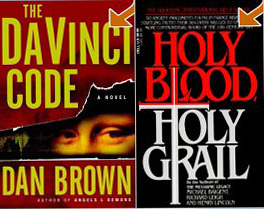
Two of the authors of “Holy Blood, Holy Grail,” recently lost their copyright infringement suit against genre thriller author, Dan Brown, for his book the “Da Vinci Code.” Brown heavily relied on the theories of the secret lineage of Jesus found in Holy Blood (a best seller in its own time.) Both books were published by Random House, but that did not stop Michael Baigent and Richard Leigh from suing their own publisher for copyright infringement. A judge found that Baigent and Leigh could not prove (or even define) the central themes of their book were stolen and further did not think it was a good idea to have authors of “pretend historical books” scour over fiction works looking for stolen ideas.
Mark Stephens, a media lawyer for the losing side lawyer stated:
“Whilst the decision shows that he didn’t infringe copyright, his moral behavior is more, in my view, open to question. It’s clear that he used the fundamental themes and ideas of ‘Holy Blood, Holy Grail,’ and many people will think that morally, Dan Brown owes a debt to Baigent, Leigh and Lincoln.”
Of course, Dan Brown owes a “creative” debt to the authors of Holy Blood, Holy Grail. Just like all fiction authors who use non-fiction (and in this case, I’m using the word loosely), own a debt to the research they do. Claims for compensation for it goes against the centuries old traditions of how culture is created.
Aside note: In my original search, for my post on the Da Vinci code, I mistyped “Devinci Code” in the nytimes.com search, and come up with this:

The nytimes.com article search engine couldn’t find anything. Amusingly, it suggested I was searching for “deviancy code.” Maybe it knows something I do not. And of course, the related sponsor ads on the top and right hand side, showed correctly identified and relevant links.
if:book
A Project of the Institute for the Future of the Book

Creative nonfiction is not a staging ground or repository for fiction writers to freely plumb. Brown walked a fine line here. Did he cross it? I’m not sure. But chalking up what sounds like lifting a work and reusing it as your own to “that’s how we’ve always done it” doesn’t work for me.
Thanks for the comment. Perhaps, I was more flip than I intended. However, I believe that “Holy Blood, Holy Grail” is mentioned in Brown’s book. Further, Brown does change and adapt parts of the theories proposed in HBHG. I agree that Brown is working in grey areas, how much repurposing needs to occur to make it a transformative use? If the authors of HBHG are stating facts, can they copyright the facts, beyond the expression of the facts? Hasn’t the legal precedent been set to allow fiction writers to use non-fiction work to inform their writing without paying for it?
there was a nice article on slate last month that spelled out most of the details of the case:
http://www.slate.com/id/2137797/
When you release a concept into the air, you have to expect that people will grab it and hold it for a while. DaVinci code is clearly not scholarship (it’s not even good fiction… but okay a fun read) and so the idea of plagarism seems bizarre to me in this case.
“Repurposing” is a word that makes my eyebrows go up. The Slate article is an interesting assessment. The next time I publish something I’ll call it fiction, nonfiction, and poetry, just so my bases are covered.
I may have been overzealous, warding off potential charge, theft of intellectual property, but my novel In the Midst Of includes seven pages of citations and a permission for outside sources.